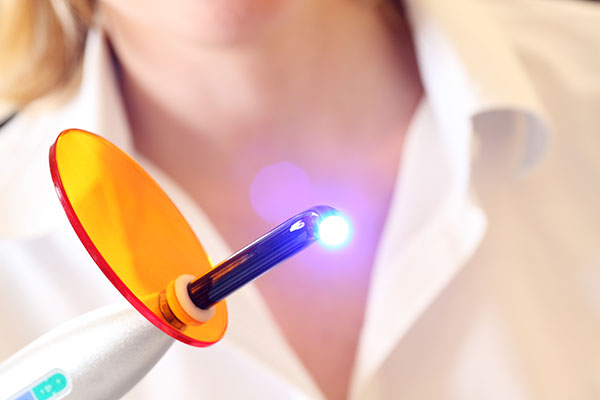What Is Laser Dentistry?

Laser dentistry involves the use of lasers to remove or transform hard or soft tissues during dental procedures. Although lasers were developed decades ago, its use in dentistry was not widespread until recently. In this article, you will learn about the types of lasers used in dentistry and the treatments where they may be applicable.
Types of Lasers
The lasers used in dentistry are soft tissue lasers and hard tissue lasers, and they both have unique applications.
Soft tissue lasers
According to the American Dental Association (ADA), the Food and Drug Administration in the United States has approved more than 20 applications of lasers in dentistry. The most common use of lasers is on soft tissues of the oral cavity such as the gums. The lasers used for such procedures include diode lasers, carbon dioxide laser, and Nd: YAG laser.
Lasers are useful for cutting and removing soft gum tissues, which makes them practical for dental procedures, such as gum reshaping for cosmetic purposes, and cutting down the gums around the tooth in a process called crown lengthening. In some cases, lasers are used to reduce gum tissue, loosen tight muscles in the mouth, treat cold sores or oral ulcers. Laser dentistry is also effective for periodontal disease treatment by eliminating the infected layer of the gum tissue surrounding the tooth and promoting regeneration of healthy gum tissues.
According to the American Association of Periodontology, it is hard to tell if laser dentistry treatment is more effective than conventional treatments of gum diseases. Laser dentistry treatment definitely has its advantages for soft tissues. Laser therapy reduces bleeding during and after surgeries, results in less discomfort (and therefore a minimal need for anesthesia), and minimizes swelling. In some cases, however, laser therapy may prolong healing and cause tissue discoloration.
Hard tissue lasers
Hard tissue lasers can cut through the hard tissues in the oral cavity, such as the teeth. This type includes the Er, CR: YSGG and Er: YAG lasers. These lasers are effective for removing tooth decay, prepare cavities for dental fillings, prep a tooth for root canal therapy, and abrade the tooth enamel to make fillings adhere to it.
Lasers created for hard-tissue procedures may minimize the need for sedation and lower the risk of overheating areas of the tooth such as the pulp (the tooth’s nerves). On the downside, hard tissue lasers can prolong the time required for treatment due to the accurate nature of laser cutting, and the results are sometimes inconsistent.
Applications of laser dentistry
Laser dentistry can be used in many dental treatments, including laser teeth whitening, placing dental restorations such as fillings and crowns, and detecting cavities. It is important to note that the ADA has not listed laser dentistry education as part of its accreditation requirements for dental education programs. This means that dentists must take additional training on using lasers through specialized programs or from manufacturers.
Final Note
Laser dentistry has its benefits when used for dental procedures. Patients who wish to try dental laser treatment will need to discuss with their dentist to know if the procedure is suitable for them.
Request an appointment here: https://familychoicedentistry.com or call Family Choice Dental at (505) 634-5657 for an appointment in our Albuquerque office.
Check out what others are saying about our services on Yelp: Read our Yelp reviews.
Related Posts
If your teeth are spaced irregularly, you might not have great self-esteem and may consider trying teeth straightening. Plus, the issue might change your oral hygiene habits. One reason is that food might get stuck in them and be difficult to remove. That can weaken the teeth and gums, leading to complications. Keep reading to…
Dental problems can happen at any time and often require immediate help to relieve pain and avoid potential complications. If you have urgent dental concerns, you might look for an emergency dentist or a same day dentist. Knowing the difference between these dental professionals can help you choose the best option for your needs.An emergency…
A kid-friendly dentist can significantly shape a child's perspective on oral care by making visits pleasant, approachable, and even enjoyable. Early experiences have a lasting effect on a child's attitude toward brushing, flossing, and maintaining routine checkups. When children feel calm and supported during dental appointments, they are more likely to maintain good habits and…
An implant dentist provides a wide range of services to restore oral health, enhance smiles, and improve overall dental function. These dental providers specialize in dental implants, a reliable and long-lasting solution for missing teeth. From placement to aftercare, the services offered by an implant dentist are designed to meet each patient’s dental needs.Dental implants…
